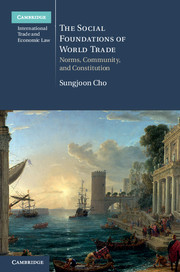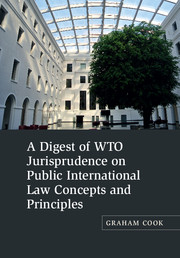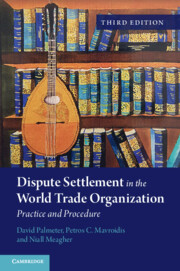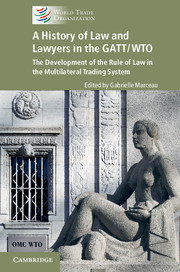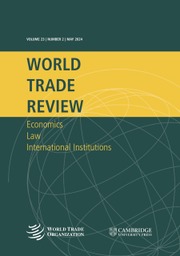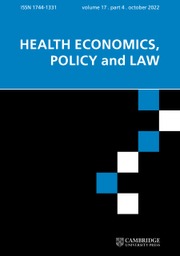The Social Foundations of World Trade
Norms, Community, and Constitution
Part of Cambridge International Trade and Economic Law
- Author: Sungjoon Cho, Chicago-Kent College of Law
- Date Published: December 2014
- availability: Available
- format: Hardback
- isbn: 9781107036611
Hardback
Other available formats:
Paperback, eBook
Looking for an inspection copy?
This title is not currently available on inspection
-
As highlighted by Pascal Lamy, the former head of the WTO, world trade traditionally involves state-to-state contracts and is based on an anachronistic 'monolocation' production/trade model. It therefore struggles to handle new patterns of trade such as global value chains, which are based on a 'multilocation' model. Although it continues to provide world trade on a general level with a powerful heuristic, the traditional 'rationalist' approach inevitably leaves certain descriptive and normative blind spots. Descriptively, it fails to explain important ideational factors, such as culture and norms, which can effectively guide the behaviour of trading nations with or without material factors such as interests and utilities. Normatively, the innate positivism of the traditional model makes it oblivious to the moral imperatives of the current world trading system, such as development. This book emphatically redresses these blind spots by reconstructing the WTO as a world trade community from a social perspective.
Read more- Proposes a community-based model for world trade law which will appeal to those who are disillusioned by the conventional framework which assumes that states are only profit maximizers
- Provides a richer and more complete understanding of the WTO by incorporating the relevant literature from political science and sociology as well as international law
- Offers a timely reference to help readers reflect on the future of the world trading system
Reviews & endorsements
'Cho's innovative book challenges the conventional rational-contract model in international trade law literature and presents a refreshing alternative perspective on the WTO. The social framework proposed in the book generates significant insights regarding the sociological functions of the WTO and enriches our understanding of international economic law. It certainly constitutes a significant contribution to international economic law literature.' Moshe Hirsch, Maria Von Hofmannsthal Chair in International Law, Hebrew University of Jerusalem
See more reviews'Cho's book makes an important contribution to the international relations literature by exploring the emerging idea of a world trade community. Sungjoon Cho offers concrete and valuable suggestions for how the World Trade Organization can strengthen its social foundations.' Steve Charnovitz, George Washington University Law School
'I enjoyed reading this book very much, it is a very timely contribution to an ongoing debate, and hopefully will provide institutional players with something to chew on and illuminate their decision making process.' Petros Mavroidis, Columbia University and European University Institute
'Professor Cho has once again justified his status as a leading scholar in international trade by offering a cutting edge, interdisciplinary framework for examining international trade. This new volume offers a refreshing and novel analysis of world trade using analytical tools from sociology and political science literatures, and in the process reconsiders the appropriateness and optimality of the global trading system itself.' Christopher Brummer, Georgetown University Law Center
'How should we understand the international trade system? Changing modes of economic production, substantial shifts in geopolitical power, and long-deadlocked negotiations suggest that the WTO system is at a crossroads. In this timely book, Professor Sungjoon Cho draws on sociological insights and constructivist thought to develop a vision of the WTO as a world trade community. Cho's innovative argument offers a powerful challenge to conventional understandings and constitutes an important contribution to the literature.' Jeffrey L. Dunoff, Laura H. Carnell Professor of Law, Temple University Beasley School of Law
'Cho takes direct aim at the prevailing view of trade law as a bundle of inter-governmental contracts and he hits his target forcefully. He shows instead the social and normative power that make[s] the international trade regime possible, and in doing so he immediately shifts the debate from questions about government bargaining to questions about the ideas and assumptions that leaders share, invoke, and argue over in the negotiation and regulation of trade. This is an extremely valuable book that will become essential reading for everyone seeking to understand the law and politics of international trade today.' Ian Hurd, Northwestern University
'An inspiring book, theoretically underpinned and of high practical importance.' Joost Pauwelyn, Graduate Institute of International and Development Studies
'A most welcome book, The Social Foundations of World Trade is a clear-eyed analysis demonstrating why we must fundamentally rethink the nature of the WTO and its norms. It offers a compelling case for combining the rationalism of the contract-bargain model with normative values as a way to build a more durable and viable multilateral trading system.' James Thuo Gathii, Wing-Tat Lee Chair in International Law, Loyola Chicago Law School
'The Social Foundations of World Trade shows the costs of viewing trade agreements as contracts between states. Taking on the hard cases of the WTO, among the most contract-like and reciprocity-based international institutions one can find, Cho shows how considering the social foundations of international law helps legitimize and achieve the larger cooperative benefits that are the goals of international economic agreements.' Karen J. Alter, Northwestern University
'Cho set himself the momentous challenge to reconcile numerous major Western legal, philosophical, and sociological traditions in support of his social theory of trade. Overall, the breadth of social science theories deployed throughout demonstrates deep humanist scholarship and will particularly appeal to interdisciplinary readers.' Sonia E. Rolland, American Journal of International Law
'Professor Cho's book is provocative and learned. The citations are extensive and demonstrate his mastery of a variety of complex literatures, from international relations theory, to law-and-economics, to the philosophy and sociology of law.' Jason Webb Yackee, The Journal of World Investment & Trade
Customer reviews
Not yet reviewed
Be the first to review
Review was not posted due to profanity
×Product details
- Date Published: December 2014
- format: Hardback
- isbn: 9781107036611
- length: 266 pages
- dimensions: 236 x 158 x 21 mm
- weight: 0.54kg
- availability: Available
Table of Contents
1. Introduction: reconstructing the world trading system
2. Two frameworks on an international organization
3. The world trade community
4. Norms and discourse: the internal operation of the world trade community
5. The world trade constitution: external relationships of the world trade community
6. Evaluation: the legitimacy of the world trade community
7. Conclusion: building the world trade community.
Sorry, this resource is locked
Please register or sign in to request access. If you are having problems accessing these resources please email [email protected]
Register Sign in» Proceed
You are now leaving the Cambridge University Press website. Your eBook purchase and download will be completed by our partner www.ebooks.com. Please see the permission section of the www.ebooks.com catalogue page for details of the print & copy limits on our eBooks.
Continue ×Are you sure you want to delete your account?
This cannot be undone.
Thank you for your feedback which will help us improve our service.
If you requested a response, we will make sure to get back to you shortly.
×
